外研版九年级上,module 7 语法The Attributive Clause
- 格式:doc
- 大小:51.00 KB
- 文档页数:3
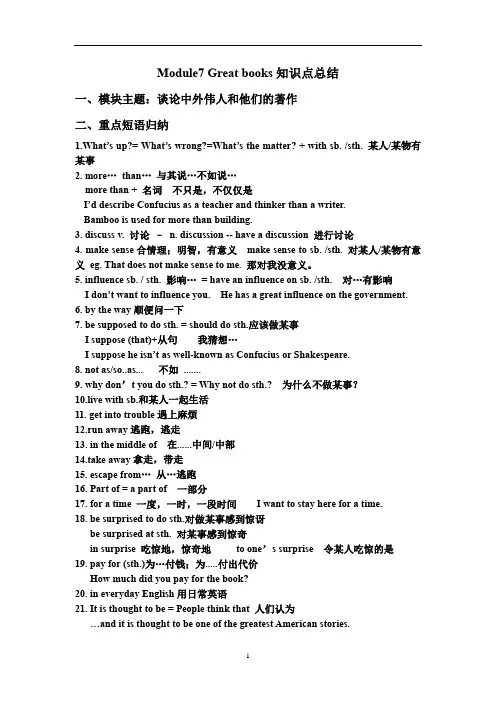
Module7 Great books知识点总结一、模块主题:谈论中外伟人和他们的著作二、重点短语归纳1.What’s up?= What’s wrong?=What’s the matter? + with sb. /sth. 某人/某物有某事2. more…than…与其说…不如说…more than + 名词不只是,不仅仅是I’d describe Confucius as a teacher and thinker than a writer.Bamboo is used for more than building.3. discuss v. 讨论–n. discussion -- have a discussion 进行讨论4. make sense合情理;明智,有意义make sense to sb. /sth. 对某人/某物有意义eg. That does not make sense to me. 那对我没意义。
5. influence sb. / sth. 影响…= have an influence on sb. /sth. 对…有影响I don’t want to influence you. He has a great influence on the government.6. by the way顺便问一下7. be supposed to do sth. = should do sth.应该做某事I suppose (that)+从句我猜想…I suppose he isn’t as well-known as Confucius or Shakespeare.8. not as/so..as... 不如.......9. why don’t you do sth.? = Why not do sth.? 为什么不做某事?10.live with sb.和某人一起生活11. get into trouble遇上麻烦12.run away逃跑,逃走13. in the middle of 在......中间/中部14.take away拿走,带走15. escape from…从…逃跑16. Part of = a part of 一部分17. for a time 一度,一时,一段时间I want to stay here for a time.18. be surprised to do sth.对做某事感到惊讶be surprised at sth. 对某事感到惊奇in surprise 吃惊地,惊奇地to one’s surprise 令某人吃惊的是19. pay for (sth.)为…付钱;为.....付出代价How much did you pay for the book?20. in everyday English用日常英语21. It is thought to be = People think that 人们认为…and it is thought to be one of the greatest American stories.…人们认为这本书是美国最好的小说之一。
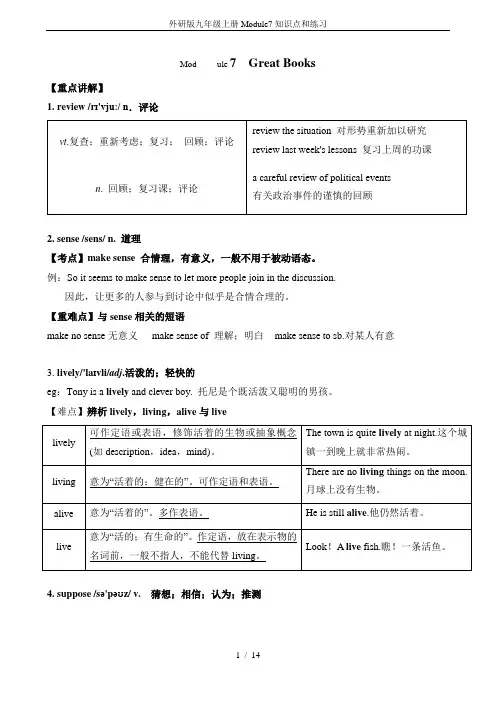
Mod ule 7 Great Books 【重点讲解】1. review /rɪ'vjuː/ n.评论vt.复查;重新考虑;复习;回顾;评论review the situation 对形势重新加以研究review last week's lessons 复习上周的功课n. 回顾;复习课;评论a careful review of political events 有关政治事件的谨慎的回顾2. sense /sens/ n. 道理【考点】make sense 合情理,有意义,一般不用于被动语态。
例:So it seems to make sense to let more people join in the discussion.因此,让更多的人参与到讨论中似乎是合情合理的。
【重难点】与sense相关的短语make no sense无意义make sense of 理解;明白make sense to sb.对某人有意3. lively/'laɪvli/adj.活泼的;轻快的eg:Tony is a lively and clever boy. 托尼是个既活泼又聪明的男孩。
【难点】辨析lively,living,alive与livelively 可作定语或表语,修饰活着的生物或抽象概念(如description,idea,mind)。
The town is quite lively at night.这个城镇一到晚上就非常热闹。
living 意为“活着的;健在的”。
可作定语和表语。
There are no living things on the moon.月球上没有生物。
alive 意为“活着的”。
多作表语。
He is still alive.他仍然活着。
live 意为“活的;有生命的”。
作定语,放在表示物的名词前,一般不指人,不能代替living。
Look!A live fish.瞧!一条活鱼。
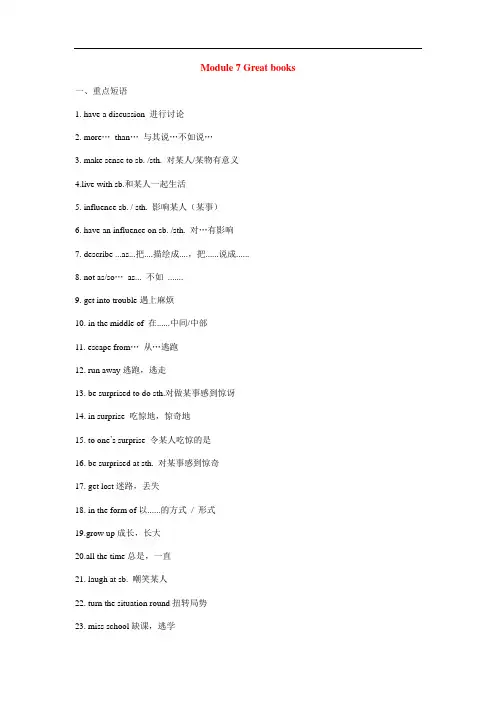
Module 7 Great books一、重点短语1. have a discussion 进行讨论2. more…than…与其说…不如说…3. make sense to sb. /sth. 对某人/某物有意义4.live with sb.和某人一起生活5. influence sb. / sth. 影响某人(某事)6. have an influence on sb. /sth. 对…有影响7. describe ...as...把....描绘成....,把......说成......8. not as/so…as... 不如 .......9. get into trouble遇上麻烦10. in the middle of 在......中间/中部11. escape from…从…逃跑12. run away逃跑,逃走13. be surprised to do sth.对做某事感到惊讶14. in surprise 吃惊地,惊奇地15. to one’s surprise 令某人吃惊的是16. be surprised at sth. 对某事感到惊奇17. get lost迷路,丢失18. in the form of以......的方式/ 形式19.grow up成长,长大20.all the time总是,一直21. laugh at sb. 嘲笑某人22. turn the situation round扭转局势23. miss school缺课,逃学24. be included in被包括在.......中25. be supposed to do sth.应该做某事26. pay for (sth.)为…付钱;为.....付出代价二、固定结构more than + 名词不只是,不仅仅是for a time 一度,一时,一小段时间It is thought to be=People think that人们认为by the way顺便问一下in return作为回报for free无偿,免费more…than…与其说是……不如说是……It's a pity that+从句遗憾的是……三.重点句型:1. why don’t you do sth.? = Why not do sth.? 为什么不做某事呢?2. What’s up? = What’s wrong?=What’s the matter? + with sb. /sth. 什么事?/ 怎么啦?3. That does not make sense to me. 那对我没意义。
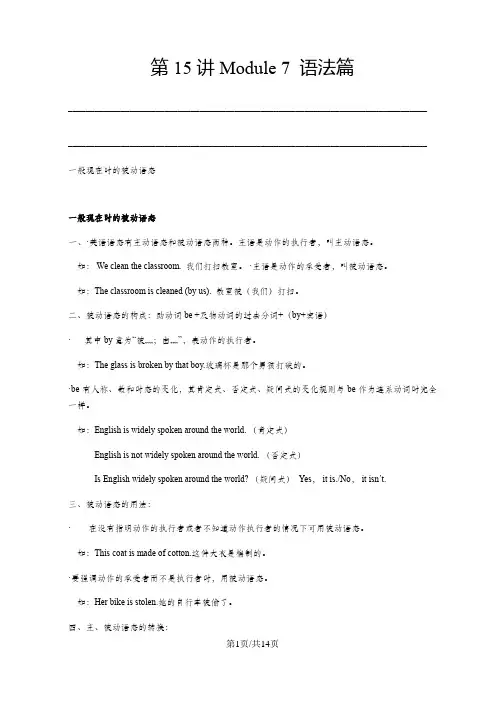
第15讲Module 7 语法篇__________________________________________________________________________________ __________________________________________________________________________________一般现在时的被动语态一般现在时的被动语态一、·英语语态有主动语态和被动语态两种。
主语是动作的执行者,叫主动语态。
如:We clean the classroom.我们打扫教室。
·主语是动作的承受者,叫被动语态。
如:The classroom is cleaned(by us).教室被(我们)打扫。
二、被动语态的构成:助动词be+及物动词的过去分词+(by+宾语)· 其中by意为“被……;由……”,表动作的执行者。
如:The glass is broken by that boy.玻璃杯是那个男孩打破的。
·be有人称、数和时态的变化,其肯定式、否定式、疑问式的变化规则与be作为连系动词时完全一样。
如:English is widely spoken around the world.(肯定式)English is not widely spoken around the world.(否定式)Is English widely spoken around the world?(疑问式)Yes,it is./No,it isn’t.三、被动语态的用法:· 在没有指明动作的执行者或者不知道动作执行者的情况下可用被动语态。
如:This coat is made of cotton.这件大衣是棉制的。
·要强调动作的承受者而不是执行者时,用被动语态。
如:Her bike is stolen.她的自行车被偷了。
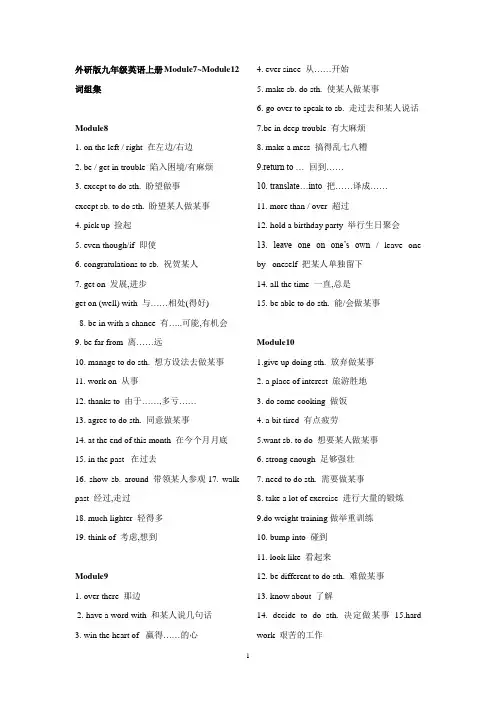
外研版九年级英语上册Module7~Module12词组集Module81. on the left / right 在左边/右边2. be / get in trouble 陷入困境/有麻烦3. except to do sth. 盼望做事except sb. to do sth. 盼望某人做某事4. pick up 捡起5. even though/if 即使6. congratulations to sb. 祝贺某人7. get on 发展,进步get on (well) with 与……相处(得好)8. be in with a chance 有…..可能,有机会9. be far from 离……远10. manage to do sth. 想方设法去做某事11. work on 从事12. thanks to 由于……,多亏……13. agree to do sth. 同意做某事14. at the end of this month 在今个月月底15. in the past 在过去16. show sb. around 带领某人参观17. walk past 经过,走过18. much lighter 轻得多19. think of 考虑,想到Module91. over there 那边2. have a word with 和某人说几句话3. win the heart of 赢得……的心4. ever since 从……开始5. make sb. do sth. 使某人做某事6. go over to speak to sb. 走过去和某人说话7.be in deep trouble 有大麻烦8. make a mess 搞得乱七八糟9.return to … 回到……10. translate…into 把……译成……11. more than / over 超过12. hold a birthday party 举行生日聚会13. leave one on one’s own/ leave one by oneself 把某人单独留下14. all the time 一直,总是15. be able to do sth. 能/会做某事Module101.give up doing sth. 放弃做某事2. a place of interest 旅游胜地3. do some cooking 做饭4. a bit tired 有点疲劳5.want sb. to do 想要某人做某事6. strong enough 足够强壮7. need to do sth. 需要做某事8. take a lot of exercise 进行大量的锻炼9.do weight training做举重训练10. bump into 碰到11. look like 看起来12. be different to do sth. 难做某事13. know about 了解14. decide to do sth. 决定做某事15.hard work 艰苦的工作work hard 努力工作16. refuse to do sth. 拒绝做某事17. persuade sb. to do sth. 说服某人去做某事18. spend...on… 在某方面花(时间/金钱)做某事spend …(in) doing sth. 花(时间/金钱)做某事19.agree with sb. 同意某人20. in order to dosth. 为了做某事21. put on 增加,穿上22. had better(not) do sth. 最好(别)做某事Module111.along with 与……一起2. thanks to 由于,多亏3. add to 向……增加4. look up 查找,查阅5. come toward sb. 朝某人走过去6. come up 发生,出现,举行,进行7. present the prizes 颁奖8. be close to 靠近……, 离……近9. have a better life 过更好的生活10. close down 关闭11. protect…from… 保护……不受……侵害12. be free from不受……影响,没有……的13. a great number of 大量的,许多的14. because of 由于,因为15. at the end of the school term 在学期末16. work hard to do sth. 努力去做某事17. at the same time 在同一时间18. move to +地方搬迁到某地19. more and more people 越来越多人less and less water 越来越小水more and more difficult 越来越困难Module 121.make progress 取得进步2. a pair of trousers 一条裤子3. fill in 填写4. check in 登记入住,(在机场)办理登记手续5. the whole class 整个班6. give a warm welcome to sb. 热烈欢迎某人7. fly to 坐飞机去……8. do an English course 上英语课9. watch sb. do sth. 观看某人做某事10. at the beginning of 在……的开始11. plenty of 相当多的,大量的12. by the end of 到…..末为止;到……结束时13.take place 发生(通常指经过安排的发生Module7have a look at 看……一眼be similar to 同…..相似be the same as 与……相同give sb. a hand 帮助某人would like a hand to do 想要帮忙某事. write(a letter) to sb. 写信给人in the centre of 在……的中心by the way 顺便问一下,顺便说on one’s way to… 在某人去……的路上on one’sway back from…在某人从……回来的路上at the moment 在那时,此刻on the first day 在第一天at different times of the day 在一天的不同时间arrive at/in \get to \reach 到达keep doing sth. 坚持做某事,连续不断做某事keep sb. doing sth. 使某人连续不断做某事any other country 任何一个其他国家get back 回来,取回as soon as 一……就at once 立刻。
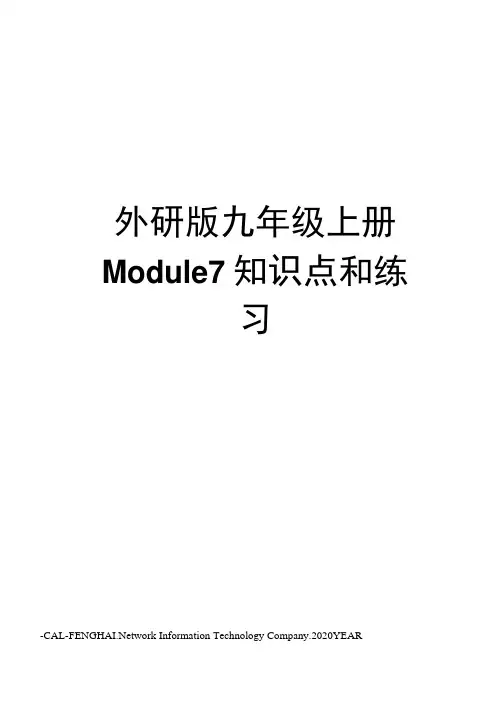
外研版九年级上册Module7知识点和练习work Information Technology Company.2020YEARMod ule 7 Great Books【重点讲解】2.sense /sens/ n.道理【考点】make sense合情理,有意义,一般不用于被动语态。
彳列:So it seems to make sense to let more people join in the discussion.因此,让更多的人参与到讨论中似乎是合情合理的。
【重难点】与sense相关的短语make no sense 无意义make sense of 理解;明口make sense to sb•对某人有意3. lively/hivli/姉•活泼的;轻快的eg: Tony is a lively and clever boy.托尼是个既活泼乂聪明的男孩。
5. escape/fskeip/ v.逃离;逃脱[考点]l.tscapeM逃走,逃脱,脱离。
通常与from连用。
eg: The thief has escaped.贼已经逃走了。
2.escape vt.避开、躲避不愉快的事(如危险、处罚、不幸、灾难等)。
eg: He tried to escape punishment.他设法躲避惩罚。
3.escape后跟动词时,应跟其动名词形式。
eg: There is no way to escape doing the work.没有办法逃脱做这项工作。
【拓展】常见必须跟动名词作宾语的动词及短语:enjoy, finish, mind, practise, risk, allow, avoid, imagine, suggest, feel like, can'thelp(情不自禁),put off, give up典例精讲:Some naughty boys wanted to escape ________ ・[B]A. punishingB. being punishedC. be punishing D・ to bepunished6・ southern/^Adan / adj.南方的【考点】south, nortlb east, west在词尾加上ern后,变为形容词southern, northern, eastern, western o eg: Rice is usually planted in southern China.水稻通常在中国南方种植。
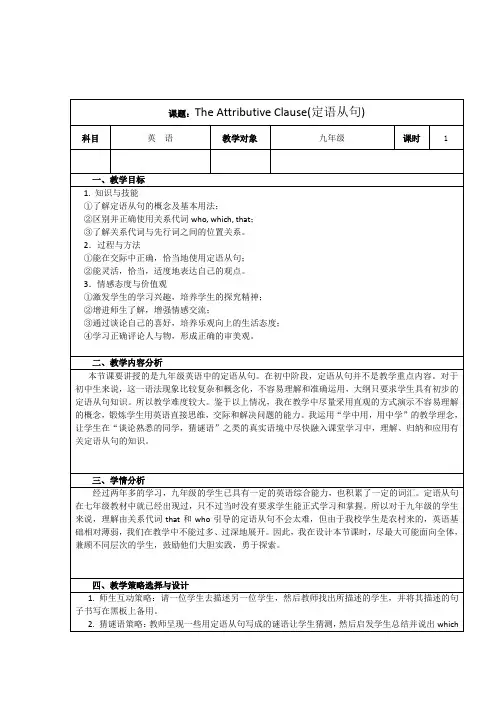
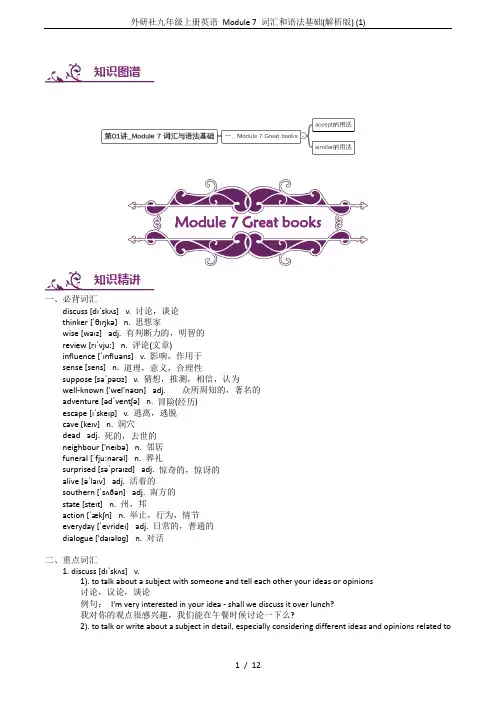
知识图谱Module 7 Great books知识精讲一、必背词汇discuss [dɪˈskʌs]v. 讨论,谈论thinker [ˈθɪŋkə]n. 思想家wise [waɪz]adj. 有判断力的,明智的review [rɪˈvju:]n. 评论(文章)influence [ˈɪnfluəns]v. 影响,作用于sense [sens]n. 道理,意义,合理性suppose [səˈpəʊz]v. 猜想,推测,相信,认为well-known ['wel'nəʊn]adj.众所周知的,著名的adventure [ədˈventʃə]n. 冒险(经历)escape [ɪˈskeɪp]v. 逃离,逃脱cave [keɪv]n. 洞穴dead adj. 死的,去世的neighbour ['neɪbə]n. 邻居funeral [ˈfju:nərəl]n. 葬礼surprised [səˈpraɪzd]adj. 惊奇的,惊讶的alive [əˈlaɪv]adj. 活着的southern [ˈsʌðən]adj. 南方的state [steɪt]n. 州,邦action [ˈækʃn]n. 举止,行为,情节everyday [ˈevrideɪ]adj. 日常的,普通的dialogue ['daɪəlɒɡ]n. 对话二、重点词汇1. discuss [dɪˈskʌs]v.1). to talk about a subject with someone and tell each other your ideas or opinions讨论,议论,谈论例句:I'm very interested in your idea - shall we discuss it over lunch?我对你的观点很感兴趣,我们能在午餐时候讨论一下么?2). to talk or write about a subject in detail, especially considering different ideas and opinions related toit论述,阐述例句:The later chapters discuss the effects on the environment.后面的几章阐述了对环境产生的影响。
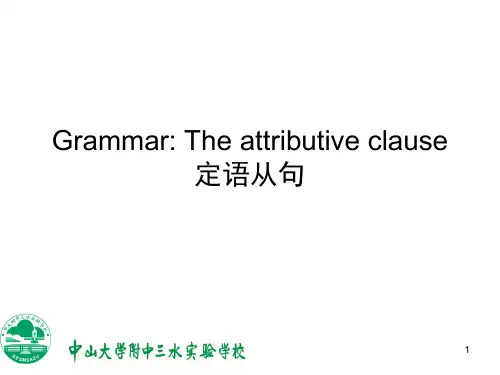

外研版九年级上册Module7知识点和练习work Information Technology Company.2020YEARMod ule 7 Great Books【重点讲解】2.sense /sens/ n.道理【考点】make sense合情理,有意义,一般不用于被动语态。
彳列:So it seems to make sense to let more people join in the discussion.因此,让更多的人参与到讨论中似乎是合情合理的。
【重难点】与sense相关的短语make no sense 无意义make sense of 理解;明口make sense to sb•对某人有意3. lively/hivli/姉•活泼的;轻快的eg: Tony is a lively and clever boy.托尼是个既活泼乂聪明的男孩。
5. escape/fskeip/ v.逃离;逃脱[考点]l.tscapeM逃走,逃脱,脱离。
通常与from连用。
eg: The thief has escaped.贼已经逃走了。
2.escape vt.避开、躲避不愉快的事(如危险、处罚、不幸、灾难等)。
eg: He tried to escape punishment.他设法躲避惩罚。
3.escape后跟动词时,应跟其动名词形式。
eg: There is no way to escape doing the work.没有办法逃脱做这项工作。
【拓展】常见必须跟动名词作宾语的动词及短语:enjoy, finish, mind, practise, risk, allow, avoid, imagine, suggest, feel like, can'thelp(情不自禁),put off, give up典例精讲:Some naughty boys wanted to escape ________ ・[B]A. punishingB. being punishedC. be punishing D・ to bepunished6・ southern/^Adan / adj.南方的【考点】south, nortlb east, west在词尾加上ern后,变为形容词southern, northern, eastern, western o eg: Rice is usually planted in southern China.水稻通常在中国南方种植。
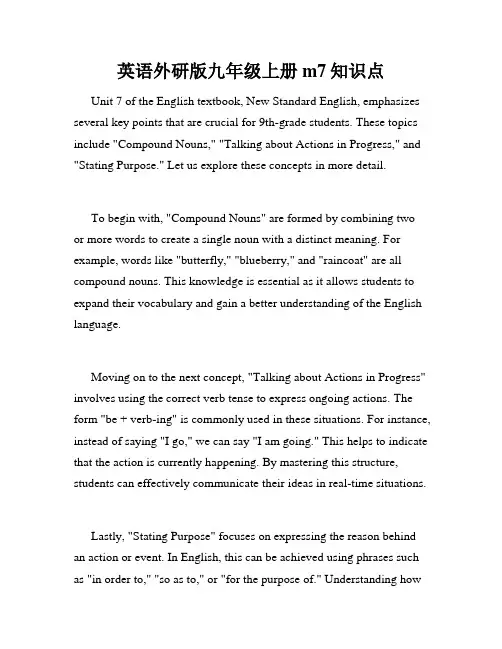
英语外研版九年级上册m7知识点Unit 7 of the English textbook, New Standard English, emphasizes several key points that are crucial for 9th-grade students. These topics include "Compound Nouns," "Talking about Actions in Progress," and "Stating Purpose." Let us explore these concepts in more detail.To begin with, "Compound Nouns" are formed by combining twoor more words to create a single noun with a distinct meaning. For example, words like "butterfly," "blueberry," and "raincoat" are all compound nouns. This knowledge is essential as it allows students to expand their vocabulary and gain a better understanding of the English language.Moving on to the next concept, "Talking about Actions in Progress" involves using the correct verb tense to express ongoing actions. The form "be + verb-ing" is commonly used in these situations. For instance, instead of saying "I go," we can say "I am going." This helps to indicate that the action is currently happening. By mastering this structure, students can effectively communicate their ideas in real-time situations.Lastly, "Stating Purpose" focuses on expressing the reason behind an action or event. In English, this can be achieved using phrases such as "in order to," "so as to," or "for the purpose of." Understanding howto state purpose allows students to clearly explain their intentions and motivations. For example, instead of saying "I will eat," one can say "I will eat in order to gain energy." This conveys a specific purpose and adds depth to the expression.It is worth noting that these concepts build upon the foundation laid in previous units of the textbook. For instance, the knowledge of basic nouns and verbs is essential before delving into compound nouns. Similarly, understanding verb tenses is crucial before attempting to talk about actions in progress. The unit's progression ensures that students accumulate knowledge and apply it in increasingly complex contexts.To further enhance learning, students can practice these concepts through various activities. For example, engaging in conversations, writing short stories, or even participating in group presentations enables them to apply what they have learned. These activities encourage students to think critically, communicate effectively, and develop a deeper understanding of the English language.In conclusion, Unit 7 of the English textbook, New Standard English, covers essential knowledge points for 9th-grade students. The concepts of "Compound Nouns," "Talking about Actions in Progress," and "Stating Purpose" provide students with the necessary tools toexpand their vocabulary, express ongoing actions, and explain motivations in a clear and purposeful manner. By mastering these concepts, students can confidently navigate the English language and continue to build upon their language skills in the future.。
第15讲Module 7 语法篇____________________________________________________________________________________________________________________________________________________________________一般现在时的被动语态一般现在时的被动语态一、·英语语态有主动语态和被动语态两种。
主语是动作的执行者,叫主动语态。
如:We clean the classroom.我们打扫教室。
·主语是动作的承受者,叫被动语态。
如:The classroom is cleaned(by us).教室被(我们)打扫。
二、被动语态的构成:助动词be+及物动词的过去分词+(by+宾语)· 其中by意为“被……;由……”,表动作的执行者。
如:The glass is broken by that boy.玻璃杯是那个男孩打破的。
·be有人称、数和时态的变化,其肯定式、否定式、疑问式的变化规则与be作为连系动词时完全一样。
如:English is widely spoken around the world.(肯定式)English is not widely spoken around the world.(否定式)Is English widely spoken around the world?(疑问式)Yes,it is./No,it isn’t.三、被动语态的用法:· 在没有指明动作的执行者或者不知道动作执行者的情况下可用被动语态。
如:This coat is made of cotton.这件大衣是棉制的。
·要强调动作的承受者而不是执行者时,用被动语态。
如:Her bike is stolen.她的自行车被偷了。
Module 7知识点一.What’s up?的用法:1,询问某人怎么样:相当于:What’s wrong ?=What’s the matter ?2, 询问某人近来过的怎么样:相当于How ‘s it /everything going ? =How are you doing ?回答:Nothing ./Nothing special .二:accept 的用法:1,表示接受,既可作及物动词,也可作不及物动词例:She offered him a lift and he accepted her offer .He asked her to marry him and she accepted .2, receive 和accept 的区别:Receive 指被动地收到或接受,accept 指主动地接受例:She received his present ,but she didn’t accept it .3, accept 后可接名词或代词做宾语,但一般不接不定式,表示“接受做某事”可用agree to do sth例:His idea was such a good one that we all agreed to use it .例:I didn’t mean to trouble Curry yesterday .It was pouring with rain so I _____ his offer of a lift . A, refused B.,, received C, allowed D, accepted三:What do you think of ……?的用法:用来询问对方对某事的看法,相当于“How do you like …….?”例:What do you think of the food here ?It’s very delicious .How do you like the life here ?It ‘s very comfortable .四:suppose 的用法:作及物动词“认为,猜想,料想,假设”1, 后接that 引导的宾语从句,that 可以省略例:I suppose we’ll go there next week .2,suppose +sb/sth +不定式例:I supposed her to have already left for home .3, suppose 作插入语You don’t mind my smoking ,I suppose .4, be supposed to do sth :因该做某事例:We are supposed to behave properly in public places .五,see sb doing sth :“看见某人正在做某事”类似的动词还有:feel ,hear ,watch ,notice这类动词后的宾语补足语也可以是不带to 的动词不定式,表示已经完成的动作例:I saw the suspect entering the building .我看见嫌疑人正进入大楼I saw the suspect enter the building .我看见嫌疑人进入了大楼例:I tried to make Alice ______her mind but I found it difficult .Well ,I saw you ____that when I went past .A, changed ;do B, changes ;doing C, change ;to do D, change ;doing六,be surprised to 的用法:“对。
外研初三上册Module 7核心词汇+核心句型+语法归纳Unit 1 We’re still influenced by Confucius’ideas.【核心词汇】【核心短语】maybe意为“或许”。
作副词,在句中作状语,相当于perhaps,常位于句首。
Maybe she’ll come this afternoon. 她可能今天下午来。
【拓展】may be在may be中,may是情态动词,be是动词原形,两者构成完整的谓语形式,与主语形成系表结构,意为“也许是; 可能是”。
I can’t find my watch. It may be in your pocket. 我找不到我的手表了。
它可能在你的口袋里。
as …as 和……一样as + 形容词/副词原级+ asLittle Jimmy does homework as carefully as his brother. 小吉米做作业和他的哥哥一样认真。
Why don’t you /we + 动词原形?= Why not + 动词原形?什么缘故不…?是提建议的一种方式。
sense n. 道理;意义;合理make sense的意思是“易明白得;合情理;有意义”。
【联系课本】…and Shakespeare’s plays also make a lot of sense to us today. …influence v. 阻碍;作用于influence用作动词时,后面直截了当跟宾语,常可用于influence sb. to do sth.结构。
【联系课本】well-known adj. 众所周知的;闻名的be well-known as意为“作为…而闻名”,相当于be famous as 。
be well-known for意为“因…而著名”,相当于be famous for。
除v-ing形式外,for后还可跟名词。
Unit 2 It is still read and loved.【核心词汇】【核心短语】what to do “疑问词+不定式结构”,在句中作宾语相当于专门疑问句作宾语。
Mod ule 7 Great Books 【重点讲解】1. review /rɪ'vjuː/ n.评论vt.复查;重新考虑;复习;回顾;评论review the situation 对形势重新加以研究review last week's lessons 复习上周的功课n. 回顾;复习课;评论a careful review of political events有关政治事件的谨慎的回顾2. sense /sens/ n. 道理【考点】make sense 合情理,有意义,一般不用于被动语态。
例:So it seems to make sense to let more people join in the discussion.因此,让更多的人参与到讨论中似乎是合情合理的。
【重难点】与sense相关的短语make no sense无意义make sense of 理解;明白make sense to sb.对某人有意,3. lively/'laɪvli/adj.活泼的;轻快的eg:Tony is a lively and clever boy. 托尼是个既活泼又聪明的男孩。
【难点】辨析lively,living,alive与livelively 可作定语或表语,修饰活着的生物或抽象概念(如description,idea,mind)。
The town is quite lively at night.这个城镇一到晚上就非常热闹。
living …意为“活着的;健在的”。
可作定语和表语。
There are no living things on the moon.月球上没有生物。
alive 意为“活着的”。
多作表语。
He is still alive.他仍然活着。
live 意为“活的;有生命的”。
作定语,放在表示物的名词前,一般不指人,不能代替living。
Look!A live fish.瞧!一条活鱼。
外研九上Module7知识点归纳及练习短语概括1.What’s up?= What’s wrong?=What’s the matter? + with sb. /sth. 某人/某物有某事2. more… than…与其说…不如说…3. discuss v. 讨论– n. discussion -- have a discussion 举行讨论4. make sense合情理;明智,有意义make sense to sb. /sth. 对某人/某物有意义That does not make sense to me. 那对我没意义。
5. influence sb. / sth. 影响… = have influence on sb. /sth. 对…有影响I don’t want to influence you. He has a great influence on the government.6. by the way顺便问一下 3. be supposed to do sth. = should do sth.应该做某事7. why don’t you do sth.? = Why not do sth.? 为什么不做某事?8. not as/so..as... 不如 ....... 4.live with sb.和某人一起生活9. get into trouble遇上麻烦 6.run away逃跑,逃脱10. in the middle of 在......中间/中部 8.take away拿走,带走11. escape from…从…逃跑 10. the part of = a part of 一部分12. for a time 一度,一时,一段时间 I want to stay here for a time.13. be surprised to do sth.对做某事感到惊异be surprised at sth. 对某事感到惊异in surprise 吃惊地,惊异地to one’s surprise 令某人吃惊的是14. more than + 名词不只是,不只是是Bamboo is used for more than building.15. pay for (sth.)为…付钱;为.....支付价格How much did you pay for the book? You will have to pay for what you have done.16. in everyday English用平常英语17. It is thought to be = People think that 人们以为18. in the form of以......的方法,以.......的形式 My garden is in the form of a square.19.grow up成长,长大 14.get lost迷路,丢失20.all the time总是,一直 16.miss school旷课,逃学21. laugh at sb. 嘲笑某人smile at sb.对某人微笑22. turn the situation round扭转形势23. in return作为回报 I sent him a present in return for his help.24. be included in被包括在.......中25. for free无偿,免费 You will get a book for free.用法集萃1. What's up?什么事?2. describe ...as...把....描绘成....,把......说成......3. I suppose (that)+从句我猜测4. Why don't you do...?你为什么不.....呢?5. It's a pity that+从句遗憾的是.....6. be pleased to do sth很高兴做某事Module 7基础知识概括一、重点词汇1. ________ v.讨论,谈论2. _________ 相似的,类似的3. ________ 思想家4. ________ 明智的5. _________ 议论(文章);温习6. ________影响;作用于7. ________ v.猜测;推测8. __________ n.冒险(履历)9. _________南方的,南部的10. ________adj.死的11. _________ 邻居12. _________ 葬礼13. _________ 活着的14. _________ 州、邦15. ________行为;举止16. __________adj.平常的;平庸的二、重点短语1. make _______合情理;明智2.run _______ 逃出,逃脱,逃脱3.________for 付款4. be _____ _____ 充满5. all ____ the ______ 全世界6. _____ at 嘲笑7. in ________ 作为回报8. for ________ 免费9. all the ________ 一直三、必会语法1. The plants _______ on the farms in many areas.A. growsB. growC. is grownD. are grown2. Why don’t you _________ the discussion.A. joinB. join inC. to joinD. to join in3. 我们仍受孔子思想的影响。
The Attributive Clause
定语从句
I.定语从句的概念
用作定语的从句叫做定语从句。
定语从句通常置于它所修饰的名词(或代词)之后,这种名词(或代词)叫做先行词。
引导定语从句的关系词为关系代词和关系副词。
关系代词(who,whom, whose,that,which等)在定语从句中可用作主语、定语、宾语等;关系副词(when,where,why等)在定语从句中只用作状语。
1.that 引导的定语从句
that 作关系词可指无生命的事物,也可指有生命的动物或人。
在从句中作主语宾语表语,作宾语时还可省掉。
eg. A plane is a machine that can fly.
The boy that I know studies best in his class.
He doesn’t seem to be the man that he was ten years ago.
2.which,who 引导的定语从句
which 引导的定语从句修饰的时无生命的东西,在从句中作主语和宾语。
先行词是人时,选who 为引导词,在从句中作主语或宾语,作宾语时也可用whom.
The photo which we like best was taken by zhao Min
His father is the person who will be most unhappy
noun/pronoun + 关系代词+定从
1.I’ve read all the books (that) you lent me.
2.Who is the girl that talked to you yesterday?
Please join the sentences together.
1 I prefer movies.
Movies are interesting
_______________________________________
2 This is the doctor.
He saved the boy’s life.
_______________________________________
3 I don’t like the people.
They smoke a lot.
________________________________________
4 The lady is Mrs.Green.
We saw her yesterday
__________________________________________
5 The eggs were not fresh.
I bought the eggs yesterday.
_____________________________________________
6. I don’t like movies.
I can’t understand them.
______________________________________________
1. I don’t like movies _____ I can’t understand.
2. Celia doesn’t like the girl _____ is always late.
3. Singers like bands _____ don’t play too loud.
4. It’s difficult to pronounce words ____ are very long.
5. It’s the kind of food _____ makes you thirsty.
<注意> :定语从句中谓语动词的单复数应与先行词保持一致.
I prefer movies that are scary.
I like a sandwich that is really delicious.
I love the singer that is beautiful.
I have a friend that plays sports.
Fill in each blank. Use the proper verbs
1. Lin Hui likes books that _____ short.
2. I have a friend that _____ the piano well.
3. I like people who _____ interesting.
4. My parents prefer music that ____quiet.
6. We like musicians who _____ beautiful music.
<注意>
(1) 先行词为all, everything, nothing, something,
anything, little, much 等不定代词时。
(2)先行词被all, every, no, some, any, little, much等
修饰时。
(3)先行词被序数词或最高级修饰时。
(4)先行词被the only, the same, the last修饰时。
练习:
I am sure she has something ______you can borrow
I’ve read all the books_______ are not mine.
This is the first book _________ he has read.
This is the only book _________belongs to him
Practice
1.吉姆为我找到了我昨天丢了的那把钥匙。
Jim found the key. I lost the key yesterday.
__________________________________________
2. 怀特夫人照看的那个小孩病了。
The child is ill. Mrs White takes care of the child.
____________________________________________
3.昨天我收到我父母寄来的信。
I received the letter yesterday.
The letter was from my parents
______________________________________________
3.你可以参加你感兴趣的任何体育活动。
You can take part in any sports.
You are interested in the sports.
_________________________________________________ 中考链接
( )1 I like music______ I can dance to.
A who
B whose
C that
( ) 2 I am looking for the photos ____ you sent to me yesterday.
A that
B why
C who
( ) 3 This is the best film ____ I have seen this year.
A whose
B that
C when
( ) 4 She is a kind girl _ often helps others.
A when
B why
C where
D who。